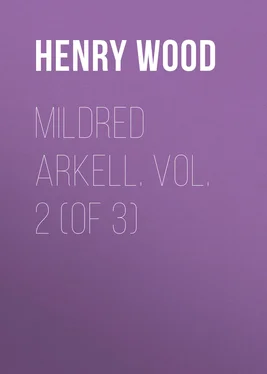Henry Wood - Mildred Arkell. Vol. 2 (of 3)
Здесь есть возможность читать онлайн «Henry Wood - Mildred Arkell. Vol. 2 (of 3)» — ознакомительный отрывок электронной книги совершенно бесплатно, а после прочтения отрывка купить полную версию. В некоторых случаях можно слушать аудио, скачать через торрент в формате fb2 и присутствует краткое содержание. Жанр: foreign_sf, literature_19, foreign_antique, foreign_prose, на английском языке. Описание произведения, (предисловие) а так же отзывы посетителей доступны на портале библиотеки ЛибКат.
- Название:Mildred Arkell. Vol. 2 (of 3)
- Автор:
- Жанр:
- Год:неизвестен
- ISBN:нет данных
- Рейтинг книги:4 / 5. Голосов: 1
-
Избранное:Добавить в избранное
- Отзывы:
-
Ваша оценка:
- 80
- 1
- 2
- 3
- 4
- 5
Mildred Arkell. Vol. 2 (of 3): краткое содержание, описание и аннотация
Предлагаем к чтению аннотацию, описание, краткое содержание или предисловие (зависит от того, что написал сам автор книги «Mildred Arkell. Vol. 2 (of 3)»). Если вы не нашли необходимую информацию о книге — напишите в комментариях, мы постараемся отыскать её.
Mildred Arkell. Vol. 2 (of 3) — читать онлайн ознакомительный отрывок
Ниже представлен текст книги, разбитый по страницам. Система сохранения места последней прочитанной страницы, позволяет с удобством читать онлайн бесплатно книгу «Mildred Arkell. Vol. 2 (of 3)», без необходимости каждый раз заново искать на чём Вы остановились. Поставьте закладку, и сможете в любой момент перейти на страницу, на которой закончили чтение.
Интервал:
Закладка:
But, had Mr. Dundyke's soul been wholly given up to poetry and sentiment, it would have been lost that day in the overpowering heat. He bore it as long as he could, and then suddenly told the men to bear to the right and put him on shore. This movement had been observed by Mr. Hardcastle, from the little island, as you may remember. The men, not sorry perhaps to be off the lake themselves, inured though they were to Geneva's August sun, made speedily for a shady place, and landed him.
"Ah! this is pleasant," exclaimed Mr. Dundyke, throwing himself at full length on the cool and shady grass. "It is quite Heaven, this is, after that horrid burning lake." The two boatmen laid on their oars and rested.
"How thirsty it has made me!" he resumed, "I could drink the lake dry. What a luxury some iced wine would be now! And ice is so cheap and plentiful up at the hotel yonder. Suppose I send the boat back for Mr. Hardcastle, and the two women? And tell 'em it's Paradise, sitting here, in comparison with the hot hotel; and drop in a hint about the iced wine? He will be sure to take it, and be glad of the excuse. The women would find it rather of the ratherest for heat, coming across the lake, but charming when they got here. 'Tain't far, and their complexions are not of the spoiling sort. Mrs. D.'s ain't of no particular colour at all just now, except red; and t'other's is like chalk. Oh! let 'em risk it."
Taking out his silver pencil-case (as the men deposed to subsequently) he tore a leaf from his pocket-book, scribbled a few lines on it, and folding it, directed it to – Hardcastle, Esquire: and it had never occurred to Mr. Dundyke until that moment, and the fact struck him as a singular one, that he was ignorant of – Hardcastle, Esquire's Christian name. The men received the note and their orders, and then prepared to push off.
"We com back when we have give dis; com back for de jontilmans?" asked the one who spoke English.
"Come back! of course you are to come back," responded the common-councilman. "How am I to get home, else? But you are to bring the two ladies and the gentleman, and some ice and some wine; and to look sharp about it. Take care that the bottles don't get broke in the boat."
The men rowed away, leaving Mr. Dundyke lying there. They made good speed to the Hôtel des Bergues, according to orders, but were told that neither Mr. nor Mrs. Hardcastle was in. This caused a delay of two good hours. The boatmen lingered near the door of the hotel, waiting; and at last one of the waiters bethought himself that the ladies might be on Rousseau's Island. There they were found, and Mrs. Hardcastle read the note.
"What do you say?" she asked, tossing it to Mrs. Dundyke. "Shall we go?"
"But where is Mr. Hardcastle, ma'am?"
"Who's to know? He may be gone round to meet your husband. He saw the probable spot the boat was making for. We may as well go. Perhaps they are both waiting for us. Waiter," continued Mrs. Hardcastle, in her customary imperious manner, "let some wine be placed in the boat, and plenty of ice."
Under cover of umbrellas, the two ladies were rowed across the hot lake to the place where the men had left Mr. Dundyke. But no trace of that gentleman could now be seen; and they sat down in the shade to cool their heated faces, glad of the respite. Mrs. Hardcastle helped herself to some wine and ice, and Mrs. Dundyke presently took her work out of her pocket.
"How industrious you are!" exclaimed the idle woman. "What do you say the embroidery is for? A shirt front?"
Mrs. Dundyke displayed her work. It was for a shirt-front, and the embroidery was beautiful. She was doing two of them, she said. Her husband would require them during his shrievalty.
"I'd not take such trouble for my husband, though he were made king to-morrow," exclaimed Mrs. Hardcastle.
After making that remark she took some more wine, and subsequently dropped asleep. Mrs. Dundyke, engaged in her labour of love, for she loved both the work itself and him who was to wear it, let the time slip on unconsciously. It was only when the afternoon shadows struck on her view as becoming long, when the sun had changed his place from one part of the heavens to another, that a vague feeling of alarm stole over her.
"Where can he be? What is the time?"
She spoke aloud. Mrs. Hardcastle started at the words, and stared to see how the day had gone on. She, Mrs. Hardcastle, was the first to call out the name of Mr. Dundyke. She called it several times, and she had a loud, coarse, harsh voice; but only echo answered her. The boatmen woke up from their slumbers, and shouted in their patois, but there came no response from Mr. Dundyke. A sickening fear, whose very intensity made her heart cold, rushed over Mrs. Dundyke. Her hands shook; the red of her face turned to pallor.
"Why, you never mean to say you are alarmed!" exclaimed Mrs. Hardcastle, looking at her in surprise.
"No—no, ma'am, not exactly alarmed," returned poor Mrs. Dundyke, half ashamed to confess to the feeling. But her quivering lips gave the lie to her words. "I do think it strange he should go away, knowing he had sent for us. I was quite easy at first, thinking he had gone to sleep somewhere, overpowered with the heat. There is no danger, I suppose, that—that—anyone could fall into the water from this spot?"
There was certainly no danger of that: and the boatmen laughed at the notion, for the bank and the water were at that place nearly on a level.
"A man might walk in if he felt so inclined," observed Mrs. Hardcastle, jestingly, "but he could scarcely enter it in any other manner. And your husband is not one to cut short his life for pleasure."
Not he, indeed! Never a man less likely to make his own quietus than plain practical David Dundyke, with his future aspirations and his harmless ambition. His wife knew that the Lord Mayor's chair, shining in the distant vista, would alone have kept him from plunging head foremost into the most tempting lake that ever bubbled in the sunlight.
"There is no marvel about it," said Mrs. Hardcastle. "The boatmen were kept two hours at the hotel, remember, before we were found, and Mr. Dundyke naturally grew tired of waiting, and went away, thinking we should not come."
"But where can he be?" cried Mrs. Dundyke. "What has he done with himself?"
"He has gone back by land. There was no other course for him, if he thought—as he no doubt did think—that the boatman had misunderstood his orders and would not return."
"But, ma'am, he does not know his way back."
"Not know it! Instinct would tell it him. He has only to keep the lake on his right, and follow his nose; he would soon be in Geneva."
It was so probable a solution of the mystery, that Mrs. Dundyke had been unreasonable not to adopt it; indeed she was glad to do it; and they got into the boat, and were rowed back again, expecting Mr. Dundyke would be at the hotel. But they did not find him there. And it was nearly five o'clock then.
"That's nothing," said Mrs. Hardcastle. "The day is so hot he would take his time walking. My husband has not been in either, it seems. Rely upon it they have met and are together; they have turned into some cool café."
The ladies went upstairs together, each into her respective chamber: it has been said that the rooms joined. But that undefined dread, amounting to a positive agony, weighed still on the spirits of Mrs. Dundyke. She could not rest. Mrs. Hardcastle was attiring herself for dinner; not so Mrs. Dundyke; she stood at the door peeping out, hoping to see her husband appear in the long corridor. While thus looking, there came, creeping up the stairs, Mr. Hardcastle, stealing along, as it seemed to Mrs. Dundyke, to shun observation, his boots white, as if he had walked much in the dusty roads, his face scratched, and one of his fingers sprained (as she learnt afterwards) and bound up with a handkerchief.
Читать дальшеИнтервал:
Закладка:
Похожие книги на «Mildred Arkell. Vol. 2 (of 3)»
Представляем Вашему вниманию похожие книги на «Mildred Arkell. Vol. 2 (of 3)» списком для выбора. Мы отобрали схожую по названию и смыслу литературу в надежде предоставить читателям больше вариантов отыскать новые, интересные, ещё непрочитанные произведения.
Обсуждение, отзывы о книге «Mildred Arkell. Vol. 2 (of 3)» и просто собственные мнения читателей. Оставьте ваши комментарии, напишите, что Вы думаете о произведении, его смысле или главных героях. Укажите что конкретно понравилось, а что нет, и почему Вы так считаете.












